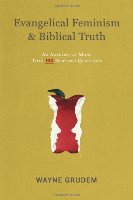Dr. Wayne Grudem is research professor of theology and biblical studies at Phoenix Seminary and a cofounder and past president of Council on Biblical Manhood and Womanhood (CBMW). The topic of his massive tome, Evangelical Feminism and Biblical Truth: An Analysis of More than 100 Disputed Questions, is always relevant, and Grudem has provided an unparalleled resource for the discussion that is not likely to be surpassed for some time. He has put much more thought into these issues than most, and we are very happy that he could give a few minutes for our readers.
Books At a Glance (Fred Zaspel):
Dr. Grudem, perhaps you could tell us something of your own interest in this subject. How did it become such an area of extended study for you? And how did the CBMW come about?
Grudem:
Before I respond directly to your question, let me say one word about the book as a whole: I think Evangelical Feminism and Biblical Truth (first published 2004 and now beautifully re-published by Crossway) is the most extensive analysis of evangelical feminist arguments that has ever been written. This book summarizes, quotes extensively, and answers all of the 118 objections that I found that evangelical feminists had raised against the biblical truths affirmed in the book Recovering Biblical Manhood and Womanhood that John Piper and I edited in 1991. I think Christians generally will find it a very useful reference work.
Now, to answer your question: My own interest in this issue began while I was still a PhD student at Cambridge University in England (from 1973 to 1976). From things I was reading that were published both in the UK and in the US, it seemed to me that the church was being led astray by misleading and false information, and incorrect biblical arguments, that were being put forth by evangelical feminists.
Then at the annual meeting of the Evangelical Theological Society (ETS) in Atlanta in 1986, I was one of the plenary speakers, but the other five were all committed evangelical feminists, all of whom were determined to criticize my position! It was quite an exciting meeting, to say the least.
However, several of us at that meeting believed that the lineup of speakers did not at all represent the viewpoints of the vast majority of members of the Evangelical Theological Society. We had a series of meetings in private that led to the writing of the Danvers Statement in 1987, and the public announcement of the formation of the Council on Biblical Manhood and Womanhood (CBMW) in Wheaton Illinois, at the ETS Meeting, in December 1988. I was one of the founding board members and have continued on the board to this day.
Books At a Glance:
Let’s start with some basics: just what is meant by the term complementarianism? How should it be understood? And perhaps you want to mention how it should not be misunderstood.
Grudem:
Complementarianism just means the belief that men and women are equal in value but different in their God-given roles in marriage and the church.
The best understanding of complementarianism, to my mind, is the official statement of the Council on Biblical Manhood and Womanhood which is called the Danvers Statement. (See http://www.cbmw.org/)
It should not be misunderstood as a viewpoint that is anti-women or that just seeks power for men. If the complementarian position is taught in the Bible, then it is the path that leads to the greatest joy and true fulfill for both men and women. But it is also challenging for both men and women to live according to the ideal standards laid out in the Bible.
Books At a Glance:
What is at stake in this discussion? What makes this such an important issue?
Grudem:
As I have explained in Evangelical Feminism and Biblical Truth and also in another book published by Crossway, Evangelical Feminism: A New path to Liberalism? (also available in Kindle). It seems to me that in this controversy the following are at stake:
- The authority of the Bible
- The health of marriages
- The health of the church
- God’s blessing on our lives (which is tied to our obedience to his Word)
- God’s blessing on our churches (which is tied to our faithfulness to his Word)
In both of the books that I just mentioned, I argue extensively that when evangelical feminists win more and more influence in churches, the churches regularly begin a systematic slide toward liberalism. This is because evangelical feminist arguments consistently, at their base, disregard or undermine the authority of the Bible.
Books At a Glance:
Briefly, what factors from the creation account establish what we call complementarianism?
Grudem:
As I explain in detail on pages 30-42 of Evangelical Feminism and Biblical Truth, I think that at least the following 10 reasons indicate that there was male leadership in marriage before there was sin in the world:
(1) Adam was created first, then Eve (Genesis 2:7, 18-23).
(2) Adam, not Eve, at a special role in representing the human race (see 1 Corinthians 15:22; also Romans 5:12-21).
(3) Adam named Eve (Genesis 2: 23)
(4) God named the human race “Man,” not “Woman” (Genesis 5:1-2).
(5) Adam, not Eve, had the primary accountability for their conduct, because God spoke to Adam first and called him to account first after the Fall (Genesis 3:9).
(6) Eve was created as a helper for Adam, not Adam as a helper for Eve (Genesis 2:18; compare 1 Corinthians 11:9).
(7) The curse that God imposed after the Fall brought conflict between Adam and Eve for leadership, but this was a distortion of previous roles, not the introduction of new roles (Genesis 3:16, where “desire” means “desire against, desire to rule over,” as the same Hebrew word does a bit later in Genesis 4:7).
(8) In the New Testament, salvation in Christ restores the beautiful creation order of male leadership and female support of that leadership in marriage (Colossians 3:18-19).
(9) God designed marriage from the beginning of creation to be a picture of the relationship between Christ and the church, in which the husband represents Christ and the wife represents the church (see Ephesians 5:31-32, where Paul draws a quotation from Genesis 2, prior to sin, to show what marriage should be like).
(10) The equality, differences, and unity between men and women in marriage reflect the equality, differences and unity in the Trinity (1 Corinthians 11:3).
Books At a Glance:
1 Timothy 2:12 is a famous battle ground, specifically the much-discussed word authenteo, translated in the ESV “exercise authority” – “I do not permit a woman to exercise authority over a man.” Some have claimed that the word indicates a usurping of authority but not necessarily an exercise of authority. What are the facts about this verb? And what kind of “authority” is in view? I know this is a big question, but is there a brief answer?
Grudem:
The brief answer is that the word just means “exercise authority” or “have authority.” It does not have a negative connotation such as “misuse authority” or “usurp authority.” I support this understanding with many pages of evidence.
(I also might add that I strongly disagree with the 2011 NIV translation, “assume authority.” The evidence from the context and from ancient examples of this word simply do not support that translation. It has been promoted as a “compromise” between complementarian and egalitarian interpretations, but it is nothing of the kind. It just opens the door wide to women assuming the role of pastor or elder in a church and then saying that they are not disagreeing with 1 Timothy 2:12 because they didn’t “assume authority,” since it was given to them by a vote of the elder board. That is not at all the situation that Paul intended, and the effect of this new NIV is that it just allows anyone who wishes to disobey Paul’s command to do so, and justify it with the NIV.)
Books At a Glance:
Perhaps you could give us a brief snapshot of what a complementarian home and a complementarian church, as biblically defined, should look like. Can you describe this in broad strokes?
Grudem:
They are places where both men and women joyfully live in fulfillment of God’s commands, and experience God’s repeated blessing on their lives as a result. I am not saying they are trouble-free, for we are all still sinners and we live in a sinful world, but I’m saying that, in general, complementarians live in far greater fulfillment of God’s commands about men and women and evangelical feminists do, and that greater obedience brings blessings to their lives.
Books At a Glance:
Your book opposes evangelical feminism, but do you see ways in which traditionally-shaped churches have generally erred to the other side? Is there any counsel you could give on this score?
Grudem:
I regularly teach that in previous generations I think it was much more common for men to devalue the importance of their wives and their great wisdom and insight in every life situation. And I think that in previous generations churches also failed to give enough room for women to exercise all the spiritual gifts that God had given them. I think that the evangelical feminist movement has been beneficial in helping us to realize that many of our traditional practices from previous generations failed to honor and value women as much as the Bible does.
Books At a Glance:
We’re fairly sure that your work has drawn some fire, but have you and/or CBMW been able to see any significant advances made in the discussion with evangelical egalitarians? In what ways are you encouraged in this effort?
Grudem:
Sadly, for the most part I’m afraid the answer is no. Several years ago some of the leaders from the Council on Biblical Manhood and Womanhood met privately with some of the leaders from the egalitarian organization Christians for Biblical Equality (CBE). We talked for some time and came to a verbal agreement that we would issue a joint statement defining and condemning abuse within marriage, since both organizations strongly believe that abuse was wrong.
But we were disappointed when, after the wording of the statement had been worked out at length, the leaders of CBE decided that they could not issue the joint statement along with the leaders of CBMW – even a statement on the evils of abuse! I was quite discouraged by that decision by them.
On the other hand, if you ask about the evangelical world as a whole, I have been greatly encouraged to see how many churches, denominations, organizations, publishing houses, books, and Christian leaders have continued to faithfully teach and practice complementarian convictions regarding the beautiful, God-given roles for men and women in marriage and the church that are so clearly taught in Scripture.

